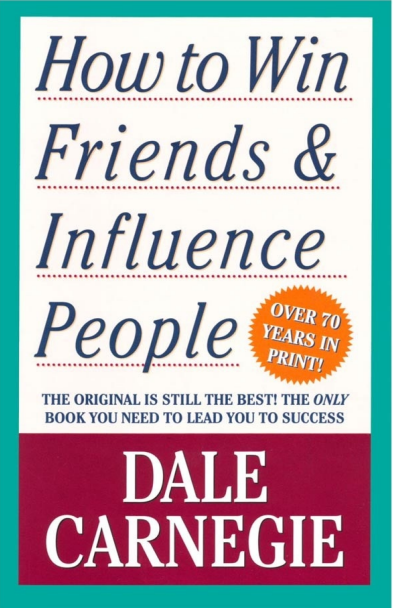
“You can make more friends in two months by becoming interested in other people than you can in two years by trying to get other people interested in you.”
This quote reflects the core message of Carnegie’s philosophy: focus on others, and you’ll naturally gain influence and build meaningful relationships.
This book is the ultimate guide to mastering human relationships, first published in 1936 but still wildly relevant today. Carnegie’s core philosophy is simple: success stems from understanding people, not manipulating them. The book is packed with timeless principles for building genuine connections, winning people over, and becoming a more effective communicator.
Fundamental Techniques in Handling People
Avoid criticism, condemnation, or complaining (they breed resentment).
Give honest and sincere appreciation (people crave recognition).
Arouse in others an eager want (align your goals with theirs).
Six Ways to Make People Like You
Become genuinely interested in others (people love talking about themselves).
Smile (it’s contagious and builds instant rapport).
Remember names (it’s the sweetest sound to anyone).
Be a good listener (encourage others to talk about themselves).
Talk in terms of the other person’s interests (find common ground).
Make the other person feel important—and do it sincerely.
How to Win People to Your Way of Thinking
Avoid arguments (you can’t win—they just create resistance).
Never say “You’re wrong” (instead, say, “I may be wrong, but…”).
Admit your mistakes quickly and emphatically.
Let the other person feel the idea is theirs (people love their own ideas).
See things from their perspective (empathy disarms conflict).
Be a Leader: How to Change People Without Offending Them
Begin with praise and honest appreciation.
Call attention to mistakes indirectly (criticize the act, not the person).
Talk about your own mistakes first (makes advice more acceptable).
Ask questions instead of giving orders (people prefer autonomy).
Praise every improvement (encouragement fuels motivation).
Carnegie illustrates these principles with real-life examples—from Abraham Lincoln’s diplomacy to business leaders who thrived by making others feel valued. The book’s power lies in its simplicity: people respond to kindness, respect, and genuine interest. Whether in business, friendships, or family relationships, Carnegie’s advice helps you navigate social dynamics with grace and influence.